It was 1886, and fizzy drinks were clearly becoming a thing, soda fountains gradually becoming the most popular places all over the country.
A failure by his very nature, pharmacist John Pemberton decided to try his luck in doing something that was popular at the time, and came up with a new soda fountain drink that could become the “real thing” and stand out of the range of similar drinks as the ultimate “champion”. Coca-Cola was the result (Cox, 2008, 113).
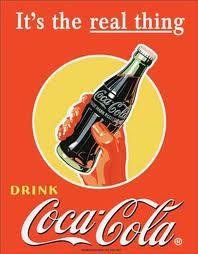
Down home foodie: 2012 (2012).
Unfortunately, the Coca-Cola Company is facing several major external threats at present, the growing impact of Pepsi and Dr. Pepper on the soda market being the key one (Deichert, Ellenbecker, Klehr & Pesrachick, 2006).
A company whose name has become the synonym of the product, Coca-Cola is still not ready to fight a strong, seeing how the recent crisis that the relocation into the global market cot the firm affected Coca-Cola’s stock price. Therefore, the increase in the authority of such companies as PepsiCo and Dr. Pepper/7-Up is the greatest threat for Coca-Cola at present.
Another obvious external threat concerns the lack of interest in customers towards Coca-Cola and its products. Coca-Cola’s leader’s unwillingness to change the traditional course of the company and take chances with brand new products may easily lead to customers losing interest.
Perhaps, the given step is rather wise in the light of tight competition – once a company fails with a new product, the rivals will use this failure as a chance to take the company’s place in the market.
There is no need to stress that in food production, practically every single outside market factor maters greatly for a company in shaping its reputation and, therefore, the process of achieving the company’s goals.
Specifically for Coca-Cola, sociocultural and global factors should be pointed out as the ones of the greatest influence. At first, the given factors might seem only a minor element of the general structure; on a second thought, however, one must agree that these two are especially important for Coca-Cola in the XXI century. To start with, the sociocultural factor is one of the key concerns at present.
Unfortunately, due to the recent surge of concerns and false accusations of Coca-Cola being an extremely harmful drink, the company may easily be facing another crisis in 2014.
For instance, such reports as Zmuda’s article clearly do not add to the Coca-Cola company’s popularity among its target audience: “the group is frustrated that Coca-Cola doesn’t spend more money advertising its healthier brands, like Honest Tea” (Zmuda, 2013, para. 4).
True, the company tried to rebut the false accusations by providing its own account of the effects that the drink has on people and even creating the line of product that supposedly had a positive effect on heart health (Coca-Cola, 2012), yet the reputation of “Killer Coke” seems to have a very strong staying power.
Regardless of the numerous attacks of critics and adversaries, the company has been thriving so far and even managed to come up with a brand new campaign regarding the Coca-Cola’s latest initiative in striving for people’s health.
Not only has the firm enhanced the production of sugarless cola, but also started funding major researches on obesity, heart diseases and other health issues: “Recent new funding includes a large grant from Coca-Cola” (Harcombe, 2013, para. 4).Therefore, the sociocultural factor, though clearly very ambiguous, seems to have been working for the company’s benefit so far.
Speaking of the second factor, one must admit that after entering the global market, Coca-Cola has been dealing with very tough competition, and the latter still remains a major issue. However, apart from difficulties regarding the choice of the right promotion campaign and advertisement strategy, global market offers a number of alluring opportunities.
For example, with the acceptance of the free trade agreement, it has become much easier for Coca-Cola to sign agreements with companies all over the world and sell its products not only in the USA, but also in Europe and Asia, thus, increasing its revenues impressively.
For instance, entering into a venture partnership with Endomondo seems to have given the company very good chances for increasing its stock price in 2014: “Under the new global agreement, Coca-Cola will help Endomondo grow its existing user base and enter into new markets and territories, while helping develop the app’s functionality and drive innovation” (Cioletti, 2013, para. 15).
Since Endomondo has an estimated total of around 12,000,000 users (Cioletti, 2013, para. 14), Coca-Cola will clearly have great chances for attracting even more clientele and enjoying an even greater success.
Five forces of competition, the term coined by Michael E. Porter, also shape Coca-Cola’s policy towards its stakeholders greatly. Presupposing that the company should take buyers, competitors, suppliers, entrants and substitutes into account, the given model allows for evaluating the company’s chances for success in the global market.
According to the latest reports, Coca-Cola should pay special attention to the substitutes and the competitors. While the statistics on buyers seems to have been quite consistent over the past few decades, the situation with competition has become much more complicated due to the specifics of the globalized environment.
Instead of winning over the SMEs within its home country and quickly becoming the industry leader, Coca-Cola must maintain its status among the companies of equally good reputation and approximately the same income. Hence the tension within the global market of fizzy drinks comes. Of all the companies producing fizzy drinks and the related goods, Pepsi seems to have been the key rival of the company for ions.
Surprisingly enough, even though Coca-Cola has clearly gained the status of the world leader in soda production and is nowadays one of the most recognizable brands period, the PepsiCo has not only withstood the defeat, but also faced it with great dignity.
More to the point, it has succeeded in its own way, making it obvious to the Coca-Cola Company that the grand fight between the brands, which will help finally define the winner, is yet to come. As InvestorGuide says, the cost per share is $82.95 at present and is yet to rise for PepsiCo:
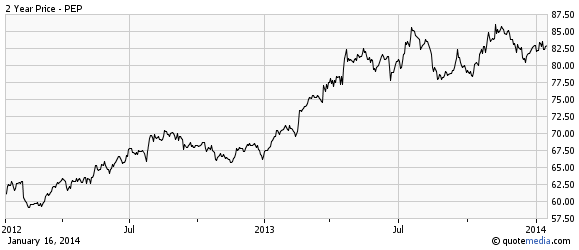
Although having a rival that is going to replenish its powers soon be the company’s side might not seem a good prospect for Coca-Cola, there are still a couple of advantages about the current situation that are worth pointing out. To start with, the fact that Coca-Cola has relatively few rivals is alone very uplifting.
In addition, it will be easy to use the fight with PepsiCo in order to attract even more attention to Coca-Cola and its brand product. Buyers are another segment of the Five Forces Model that can be used in order to improve the company’s score.
Though it is admittedly hard to come up with a new promotion campaign for a company that has practically become a staple of soda production industry, there are enough chances for using the customers’ loyalty for the company’s benefit. Moreover, the aforementioned rivalry with PepsiCo may also stir the buyers’ interest towards the company’s products.
Still, the “buyers” element in the Five Forces Model laves much to be desired in terms of the clients’ loyalty. The Coca-Cola Company needs to keep in mind that a number of people hardly differentiate between the two organizations, seeing how each of the companies is known for creating practically the same products as the other one.
One might find the given statement rather doubtful, since there are a number of companies producing soda; it should be noted, though, that both PepsiCo and Coca-Cola are known for creating a diet soda (Diet Pepsi and Diet Coke correspondingly); producing root beer (Mug Root Beer and Barq’s), mineral water (Coca-Cola’s Cristal and PepsiCo’s Aquafina), and so on. Therefore, it is crucial that Coca-Cola should come up with a unique strategy in order to be as different from PepsiCo as possible.
When it comes to discussing the strengths of the product, the incredible results of Coca-Cola marketing are often brought up. Indeed, judging by the fact that Coca-Cola has practically become a household name over the years of its existence, one must admit that its advertising campaigns have paid off impressively.
Not only does the drink stand out of the range of similar soda drinks, but is often related to a number of other nonetheless popular brands, such as the personal of Santa Claus.
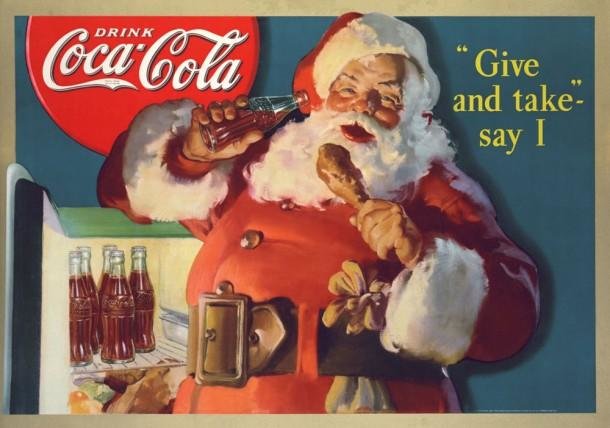
Apart from very impressive marketing, Coca-Cola has also become wildly popular due to its grand rivalry with Pepsi.
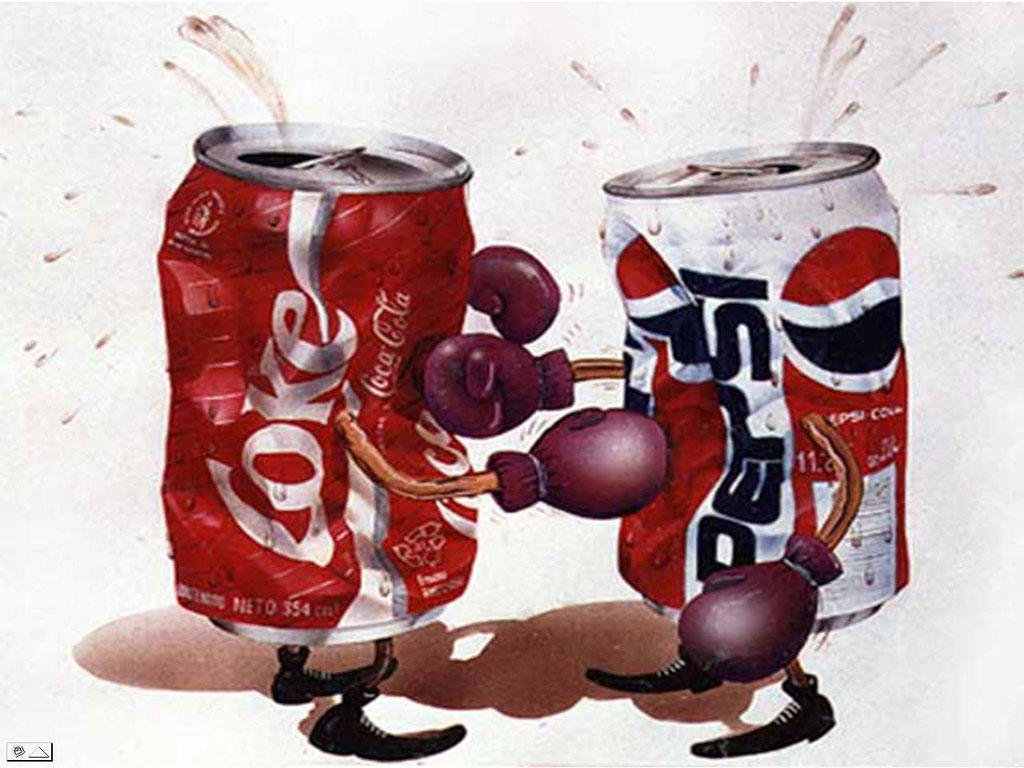
Sadly, the company also has a number of weaknesses. Speaking of rather basic problems of the brand, its lack of initiative regarding the new avenues of marketing should be mentioned. Apart from its dubious reputation in terms of its effects on people’s health, Coca-Cola has also faced a rather upsetting drop in its market value.
According to the latest report, the product’s price dropped by $0.1, or 0.25%, which resulted in a $0.113 (0.28%) drop in the company’s shares, the latter being reduced to $39.647, with the resulting EPS of 1.929 (InvestorGuide, 2014c). The given tendencies are definitely worth paying more attention to.
It seems that Coca-Cola needs a colorful and memorable promotion campaign that will attract more customers. It is also remarkable that Dr. Pepper has recently appeared among Coca-Cola’s major rivals, nearly ousting Pepsi from the picture.
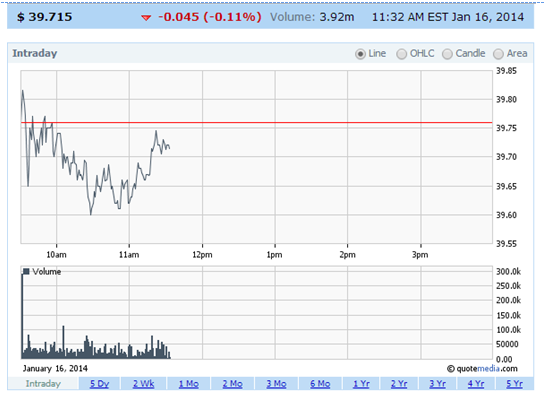
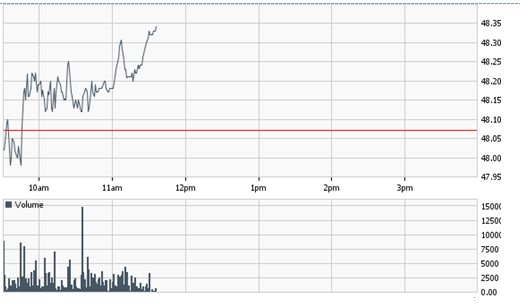
Nevertheless, Coca-Cola’s position among the rest of the soda producing companies seems rather stable. Compared to the previous year, the losses are not that big, which means that the company is capable of using its key strength as the mean to sell the product to the target audience.
Speaking of the organization’s resources and capabilities, Coca-Cola sells its product to 200 countries and operates with around 250 Coca-Cola bottlers (Conley, 2012, June 18). Coca-Cola’s value chain also deserves considering closer.
To start with, the company has a very interesting strategy for communicating to its suppliers; known as SGP, or Supplier Guiding Principles, it presupposes that the relationships with the partner companies supplying raw material should be based on mutual respect, equality and business integrity (The Coca-Cola Company, 2012). Thus, the outbound logistics of the company seems to be impeccable.
Speaking of the inbound logistics, one must mention that the Coca-Cola Company employs retailing research councils, which help the firm define the best possible strategies for delivering its product to the customers on time and in its best condition.
Due to the recent introduction of the latest technology into the company’s production process, the latter has been improved quite a few notches; even though it will take time to make sure that every single employee has been trained properly in order to operate the equipment in question, the effects of the technological “mini-revolution” within a comparatively conservative realm of the Coca-Cola Company can be considered a major breakthrough.
The company is also doing extremely well in terms of its outbound logistics, as the recent research shows. Marketing and sales, though, could definitely use some improvement, since the organization has not been making any radical changes in its image for several decades, even though its original gimmick seems to have worn out its welcome in the global market.
Reference List
Cioletti, A. (2013). Always Coca-Cola. License. Web.
Coca-Cola (2012). Fit – new diet coke commercial – supporting women’s heart health. Web.
Coca-Cola Santa Claus. Web.
Coke vs. Pepsi. Web.
Conley, A. (2012). Coca-Cola resources and capabilities. Web.
Cox, J. (2008). Sold on radio: Advertisements of the Golden Age of broadcasting. Jefferson, NC: McFarland Company.
Deichert, M., Ellenbecker, M., Klehr, E., & Pesrachick, L. (2006). Industry analysis: Soft drinks. Web.
Down home foodie: 2012 (2012). Web.
InvestorGuide (2014). Charts for PepsiCo, Inc. Web.
InvestorGuide (2014a). Detailed quote for the Coca-Cola Company. Web.
InvestorGuide (2014b). Detailed quote for Dr. Pepper Snapple Group, Inc. Web.
InvestorGuide (2014c). The Coca-Cola Company (KO). Web.
The Coca-Cola Company (2012). Supplier guiding principles. Web.
Zmuda, N. (2013). Health ad hits Coke: “Happiness doesn’t come in a red can. Obesity does.” Advertising Age. Web.